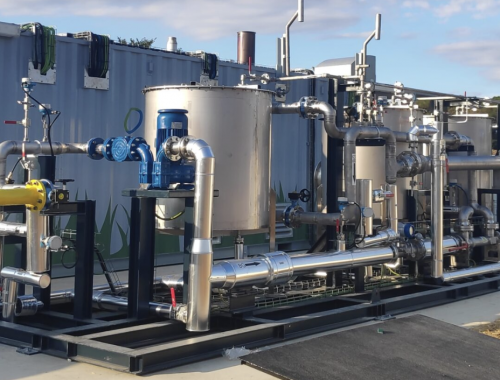CycleØ, an integrated owner and operator of biomethane projects, will begin deploying its small-scale, modular plants to meet the growing demand and distributed nature of Ireland’s agricultural and food waste feedstock with the opening of a new branch in Ireland.
The company’s technologies capture, process and upgrade naturally occurring methane gas produced principally by the agri-food and livestock industries.
CycleØ has appointed James Manley as country manager of Ireland and will begin making significant investments across the country to support the Irish government’s objective to exponentially increase the country’s biomethane production from its current nascent levels.
CycleØ CEO, Laurence Molke, said, “I’m very excited to announce the opening of our Irish branch, headed up by James, who has more than 20 years’ of comprehensive experience operating across the agricultural sector. We’re on a mission to reduce GHG emissions now and help meet the revised RePowerEU target of producing 35 bcm of biomethane by 2030. Investing in Ireland’s new biomethane sector is another step towards reaching those goals.”
To date, Ireland’s green gas industry has developed slowly due to a lack of government regulatory and financial support, as well as challenges with accessing waste feedstock from its dispersed agricultural/food sectors. according to CycleØ. As of 2021, there were only a handful of biomethane plants operating in Ireland – compared to 365 in France and 238 in Germany.
However, the country’s 180 million metric tonnes of annual agricultural waste are a feedstock resource readily available to be used for renewable natural gas production.
CycleØ is a portfolio company of Ara Partners, a private equity firm that specialises in industrial decarbonisation investments. Alongside Ara, whose European headquarters are in Dublin, CycleØ will invest and contribute towards the development of Ireland’s growing renewable natural gas sector.
Additionally, CycleØ’s manufacturing and technical subsidiary, FNX, supplies biomethane upgrading and liquefaction technology for small- and medium-sized applications which are an ideal fit with the Irish market.
Molke explained, “accessing that stranded feedstock requires a special approach that we can bring to the table. Our technical solutions, our ability to build plants economically and our engineering experience are what will let us unlock Ireland’s biomethane value chain.”
CycleØ builds, owns and operates small-to-medium-scale biomethane plants designed to be easily shipped and assembled on-site, making them ideal for deployment at remote locations to access feedstock that would otherwise be stranded, according to the firm.
Molke added, “our plants are skid-mounted and factory-tested by our experienced production and technical teams at FNX in Artea, the Basque country in northern Spain. This makes them easy to transport and minimises erection and commissioning delays. We have decades-long experience building greenfield projects and ample capital to play an active role in helping the biomethane market to take off in Ireland.”
As of 2021, there were 1,067 biomethane plants in Europe. Just two of those are in Ireland. In 2022, the Irish government set the stage for growth, aiming to cover 10% of the gas needs with green gas by 2030. To meet this target, local production will need to reach 5.7TWh. The country produced just 25 GWh of biomethane between May 2020 and August 2022.
And while the country doesn’t yet have a direct incentive program for the production of biomethane, Molke said that conversations with the country’s gas grid operator, Gas Networks Ireland, shows a firm commitment to the development of biomethane in the country.
Gas Networks Ireland, the operator of Ireland’s national gas network, is working to replace natural gas with renewable gases, such as biomethane and hydrogen, while complementing intermittent renewable electricity and supporting Ireland’s journey to a cleaner energy future.
Gas Networks Ireland’s Growth Development Manager, David Hanahoe said, “CycleØ’s expansion into Ireland is another recognition of the country’s potential to both produce biomethane and create an industry around it. An Irish indigenous biomethane industry would not only support the decarbonisation of the agricultural sector, but it would also provide significant opportunities for rural communities and facilitate sustainable circular economies. We are looking forward to working with CycleØ to establish network entry connections, and to increase the amount of biomethane that can be transported to almost 720,000 homes and businesses across the country.”
Source: Bioenergy Insight













